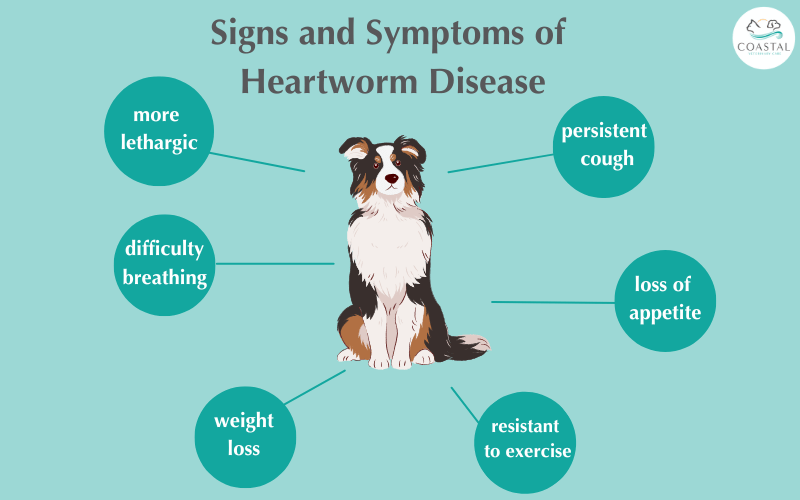Heartworm disease is a serious and potentially fatal condition caused by the parasitic worm Dirofilaria immitis. Heartworms spread to dogs when they’re bitten by an infected mosquito. The mosquito passes heartworm larvae into the dog’s body, where they grow into adult worms over the course of 6 months. Then, these worms settle in the dog’s heart and pulmonary artery, gradually causing serious harm to the organs and blood vessels.
Common symptoms of heartworm include a persistent cough, exercise intolerance, difficulty breathing, and weight loss. The American Heartworm Society (AHS) emphasizes the importance of heartworm prevention and annual testing as key strategies for protecting a dog’s health. Early detection is crucial to protect your dog’s health and minimizes the risk of complications like heart failure or caval syndrome. AHS recommends year-round prevention to protect dogs from this fatal disease, since consistent preventive care is far more effective and less costly than addressing advanced heartworm infection.
Recognizing the Symptoms of Heartworm Disease
In its early stages, heartworm infection may not show noticeable signs, but as the condition progresses, symptoms become more apparent. Common signs to watch for include:
- Persistent cough – A dry, hacking cough that doesn’t improve.
- Difficulty breathing – Labored or heavy breathing, especially during rest.
- Weight loss – Gradual or sudden loss of weight, often accompanied by a loss of appetite.
- Exercise intolerance – Reluctance to play, fatigue after minimal activity, or an inability to exercise.
If left untreated, heartworm disease can lead to severe and life-threatening conditions, such as:
- Heart failure – The strain caused by adult heartworms in the dog’s heart disrupts normal blood flow, eventually leading to heart failure.
- Lung disease – Damage to the lungs caused by the parasite can result in long-term respiratory disease.
- Caval syndrome – A critical condition where a mass of adult worms obstructs blood flow, causing sudden cardiovascular collapse.
Why Immediate Action Matters
If your dog exhibits any of these symptoms of heartworm, visit a veterinarian immediately. Catching heartworm early with a simple test can help stop serious damage and make treatment more effective. Skipping treatment puts your dog at a much higher risk of severe health problems and can even be life-threatening.
Diagnosing and Treating Heartworm Disease
The first step in identifying heartworm disease is through heartworm testing, typically performed during a routine visit to a veterinarian. Early detection is essential to minimize the damage caused by adult heartworms and heartworm larvae. Common diagnostic methods include:
- Blood Test: A simple blood test can detect proteins released by adult female heartworms in the bloodstream, confirming the presence of an infection.
- Additional Testing: If the initial results are positive, follow-up tests like X-rays, ultrasounds, or echocardiograms may be recommended to assess the extent of damage to blood vessels, the heart, and lungs.
Heartworm Treatment Options
Treating heartworm infection requires eliminating adult worms and heartworm larvae, which can be a complex process. Treatment involves:
- Adult Heartworm Elimination: The main course of treatment uses medications like melarsomine injections to kill adult heartworms in the dog’s heart and pulmonary artery. Multiple doses may be required over several months.
- Larvae Control: Additional medications target remaining heartworm larvae to prevent reinfection and further complications.
- Exercise Restriction: During treatment, strict rest is critical to avoid complications as the body works to eliminate the dead worms.
- Supportive Care: In advanced cases, supportive treatments like anti-inflammatory medications or surgery to remove large worm masses (e.g., in cases of caval syndrome) may be necessary.
Impact of Untreated Heartworm Disease
Untreated heartworm disease can cause devastating and long-lasting effects on a dog’s health, with severe damage to the heart, lungs, and blood vessels. As adult worms grow and multiply, they obstruct blood flow and impair vital organ function, leading to chronic respiratory issues such as persistent difficulty breathing and significantly reduced lung capacity.
Over time, the strain on the heart increases, often resulting in heart failure. Scarring of the pulmonary artery and surrounding tissues can also leave lasting damage, even after successful treatment.
Long-Term Effects of Heartwork Infection
Dogs that recover from heartworm infection may still face long-term health challenges. Lung damage from the disease often reduces a dog’s ability to tolerate physical activity, limiting their overall quality of life. The cardiovascular strain caused by adult worms can lead to chronic issues that persist well beyond the infection itself.
If treatment is delayed or incomplete, the risk of recurring symptoms is high. Even with treatment, the effects of heartworm disease highlight the critical need for vigilance and proactive care to ensure a dog’s long-term health and well-being.
Preventive Measures and the Role of Your Vet
Preventive care is essential in protecting your dog from the risks of heartworm disease. The use of heartworm prevention medications is a highly effective strategy to stop the transmission of heartworm larvae by infected mosquitoes, preventing them from maturing into harmful adult heartworms. Administering these medications consistently, along with regular heartworm testing, provides the most reliable defense against this dangerous condition.
Experience Exceptional Care at Coastal Vet
At Coastal Veterinary Care, we are more than just a veterinary clinic—we are a partner in your pet’s health journey. We offer a comprehensive range of services, including
- Dog Wellness Exams
- Cat and Dog Vaccinations
- Senior Pet Care
- Pet Dental Care
- And More
Our team is committed to educating pet owners and equipping them with the knowledge needed to provide a lifetime of health and happiness for their furry companions. With a dedication to modern, evidence-based veterinary practices, we ensure that your pet benefits from the latest advancements in veterinary medicine.
At Coastal Veterinary Care, our ultimate goal is to help pet owners ensure their pets live long, healthy, and fulfilling lives. Contact us today and start protecting your pet from the challenges of heartworm disease and other health concerns.
Resources:
https://todaysveterinarypractice.com/parasitology/caval-syndrome-development/




